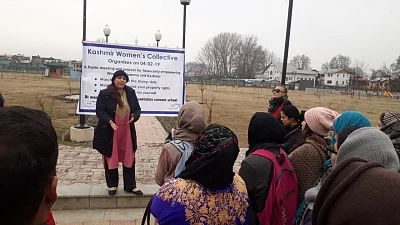By Safina Nabi
Pampore, Aug 8 (IANS/ 101Reporters) While Jammu & Kashmir (J&K) is in news usually for geopolitical tension, violence within the four walls of homes too is a serious issue facing it. In the state, everything becomes subdued owing to the larger political conflict and whatever does not suit the political agenda-statist or separatist-is given no importance. Violence against women not only goes unnoticed but also is given no importance by the society or media. Very often, it is denied.
In 2016, when violence against women was rising across different parts of India, two Kashmir-based women -- Mantasha Binti Rashid and Subreen Malik -- realised over a discussion that the ground situation was grim and robust action was required to tackle it.
"There was a need to create a space for women in Kashmir. I was thinking of forming a women's collective for some time. When I met Subreen and a few other women who were of the same thinking, I finally thought of giving it a formal shape," said Rashid, a founding member of Kashmir Women's Collective (KWC), a voluntary group to support Kashmiri women against violence and abuse. She is a civil servant with the state industries department and has studied gender and policy at State University, New York.
According to Jammu and Kashmir Women's Commission, it received 142 complaints in 2014, 155 complaints in 2015 and 177 in 2016, the year in which Kashmir was under curfew for 60 days. A total of 335 cases were registered in 2017. Of these, 277 are from Kashmir division and 58 are from Jammu division. About 95 per cent of the cases are instances of marital disputes: abuse, divorce, child custody, and maintenance.
Malik, the other founder-member of the KWC, has been a practising lawyer for nearly a decade. Her focus is on cases of domestic abuse and discrimination against women and most of her work is pro bono.
In the beginning, the KWC came into being as an online community on Women's Day in 2017. A group of young Kashmiri professionals, mostly women, who were already active in this area, got together to form the collective.
The KWC is registered as a trust and is a self-funded voluntary group. At the KWC office in Srinagar, one or two volunteers attend to women and guide them through the legal options, counsel them and help them find a means of livelihood.
Shabnam Ara, a resident of Downtown in Srinagar, was married into a family in Sopore in Baramulla district, 45 km north-west of Srinagar. As abuse and demand for dowry kept on increasing, she finally decided to come back to Srinagar. Shabnam's in-laws kept her daughter with them. Shabnam's mother-in-law said they have adopted her daughter. After spending five years without making any headway, she went to the KWC. A case was taken up on a pro bono basis and it came in her favour, allowing her to meet her daughter once a week and granting her maintenance. The KWC helped her find a job too.
Law and women
According to the J&K Protection of Women from Domestic Violence Act, 2010, a state is required to have Protection Officers (PO) and Shelter Homes (SH) for the victims of domestic violence. "It's been nine years of the Act, there is not even a single SH or PO available for the victim-survivors of violence," she alleged.
In June, the district administration admitted to the issue and agreed to come up with a shelter home within two months.
The group has conducted a women's consultative workshop, a police sensitisation workshop and a book release on transgenders in Kashmir. Additionally, they have carried out gender sensitisation workshops in different colleges, workshops with school teachers about the legal, psychological and medical aspects of child sexual abuse among other activities. They also carried out a study on The Protection of Children from Sexual Offences Act, 2012.
Talking about future projects and goals, Rashid mentioned that they are pressing the state government to establish SHs and appoint POs. They have also designed a project to tackle sexual harassment in public transportation, which will be implemented as a collaborative project between KWC and district administration of Srinagar as a pilot project.
Noted poet and historian Zareef Ahmad Zareef stressed the need for such collectives. He said such collectives are particularly important for Kashmir since the administration is slow and not accountable to anyone and the execution of any law or order is only on papers.
"When young people take up any challenge and volunteer, they do it seriously and reach to grassroots. For them it's not mere work that people generally do for livelihood, it's a cause that they care about. We should appreciate and support these networks to make our society stable as they are working for the weakest and the most vulnerable section of our society," he said.
--IANS
nabi/am/in
(At The Quint, we question everything. Play an active role in shaping our journalism by becoming a member today.)
